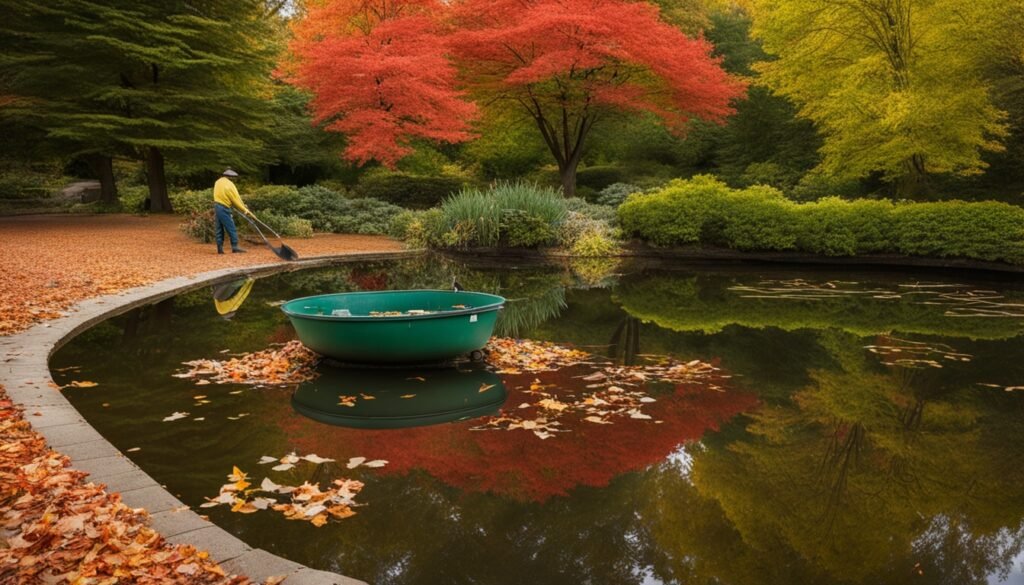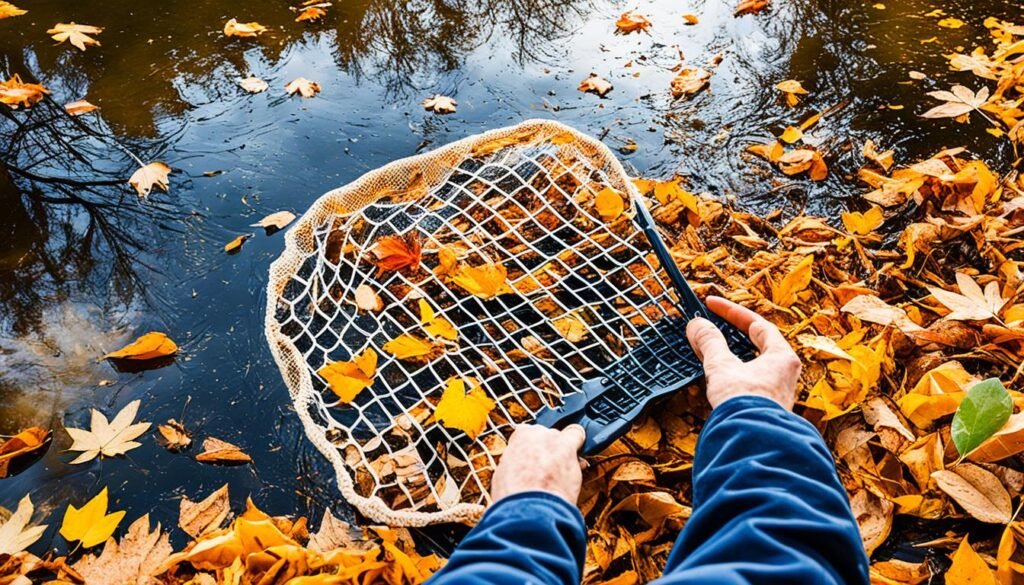I vividly recall the day I turned my backyard into a tranquil retreat. Witnessing the water flow into my new pond filled me with pride and anticipation. However, I soon realized that the true challenge was only just starting. Seasonal pond maintenance became my new passion, teaching me the critical need for continuous care.
Some of the links in this article may be affiliate links. If you make a purchase through these links, we may earn a small commission at no extra cost to you. Thank you.

Every season introduced its unique set of tasks, from spring cleaning to winter preparation. Soon, pond cleaning and water quality testing became routine for me. This dedication paid off as I observed my aquatic ecosystem flourish under my care.
This guide aims to share my experiences and advice for maintaining a healthy, vibrant pond all year. It’s designed for both seasoned pond owners and novices. You’ll discover essential tips on seasonal pond maintenance to ensure your water garden prospers.
Understanding the Importance of Year-Round Pond Care
Maintaining a healthy pond demands consistent effort throughout the year. Year-round pond care goes beyond aesthetics; it’s crucial for the well-being of aquatic life. It ensures your water garden remains a sanctuary for your aquatic companions.
Benefits of Regular Maintenance
Consistent upkeep wards off potential problems before they escalate. By focusing on algae control and fish care, I maintain a balanced and attractive pond. Regular trimming of plants aids in growth management and enhances water clarity. These actions yield significant benefits over time.
Impact on Pond Ecosystem
A meticulously cared-for pond is a sight to behold. Its health benefits extend beyond visual appeal. It fosters a thriving environment for fish, plants, and beneficial microorganisms. By ensuring the water remains clean and oxygen-rich, I create an ideal habitat for my aquatic friends.
Cost-Effectiveness of Preventive Care
Consistent care proves to be a cost-effective strategy. Tackling minor issues early on avoids major, expensive repairs. For instance, regular algae control is significantly less costly than managing a severe bloom. By dedicating time and effort throughout the year, I prevent costly repairs later on.
| Task | Frequency | Benefit |
|---|---|---|
| Algae Control | Weekly | Clear water, healthy ecosystem |
| Fish Care | Daily | Happy, healthy fish |
| Plant Trimming | Monthly | Balanced growth, improved water quality |
Spring Pond Maintenance: Awakening Your Aquatic Oasis
As winter fades, it’s time for spring pond preparation. I begin by checking my equipment, ensuring pumps and filters are clean and functioning. Removing debris that accumulated over winter is crucial to prevent water quality issues.
Next, I focus on reintroducing overwintered plants and adding new ones to enhance the ecosystem. Water quality testing becomes essential as temperatures rise. I monitor pH, ammonia, nitrite, and nitrate levels regularly.
When pond temperatures exceed 50°F (10°C), I begin feeding fish again. This gradual reintroduction of food helps their digestive systems adjust after winter dormancy.
- Trim back last year’s plant growth
- Start fertilizing with low nitrate and phosphate plant food
- Clean skimmers and filters
- Check for any damage to pond liner or edging
Spring is an exciting time for pond owners. With proper maintenance, your aquatic oasis will thrive throughout the year. Remember, consistent care now prevents issues later, ensuring a healthy and beautiful pond for seasons to come.
Summer Pond Care: Keeping Your Water Garden Thriving
As summer intensifies, your pond’s health and beauty require vigilant attention. Implementing a few strategic approaches can significantly enhance your aquatic haven’s condition during the heat.
Algae Control Strategies
Increased warmth and sunlight often trigger algae proliferation. To counteract this, consider introducing more aquatic plants to outcompete algae for nutrients. Additionally, consistent skimming and filtration upkeep are essential for maintaining water clarity.
Fish Care in Warm Weather
Summer’s warmth escalates fish activity, necessitating augmented feeding. I suggest dispensing food in measured amounts, 2-3 times per day, to prevent overfeeding. Moreover, aeration systems are indispensable for sustaining adequate oxygen levels, especially during extreme heat. If you lack a fountain or waterfall, consider installing one to enhance oxygenation.
Plant Management and Fertilization
Summer is the ideal season for aquatic plant growth. I fertilize these plants every 3-4 weeks and meticulously remove any dead foliage. This regimen not only sustains plant vitality but also curbs algae growth by diminishing excess nutrients in the water.
| Summer Pond Care Task | Frequency |
|---|---|
| Water top-up | Weekly |
| Algae removal | Bi-weekly |
| Fish feeding | 2-3 times daily |
| Plant fertilization | Every 3-4 weeks |
Consistent summer maintenance is crucial for a pond’s longevity. By prioritizing these areas, you’ll ensure your water garden remains vibrant and healthy throughout the season.
Seasonal Pond Maintenance: Autumn Preparations

With the leaves falling, it’s time to ready my pond for winter. Autumn pond maintenance is key to keeping it healthy. I begin by using a pond net to catch leaves, stopping them from sinking and rotting in the water.
Next, I trim back dying plants. This not only cleans up the pond but also limits organic matter that could break down in the water. It’s essential for keeping the water clear and preventing algae growth in spring.
Cleaning the pond is a big job in fall. I remove sludge from the bottom to avoid water quality problems and ensure a healthy environment for my fish over winter. This seasonal pond care is crucial.
I also adjust my fish’s diet as the weather cools. This helps them adapt to their winter slowdown. Additionally, I check my filters and pumps to make sure they’re working well. To boost beneficial bacteria, I add treatments like sludge removers or clean pond pods.
Finally, I plan to move my pump to shallower water. This stops cold surface water from mixing with warmer bottom water, keeping my fish comfortable in winter. With these steps done, I’m confident my pond is set for the cold months.
Winter Pond Maintenance: Protecting Your Aquatic Ecosystem
Winter pond care is essential for a thriving aquatic environment. Proper maintenance during the cold months significantly impacts your pond’s health. Let’s delve into key techniques to sustain your pond through winter.
Ice Management Techniques
Ensuring your pond remains ice-free is crucial for gas exchange. I advise using a pond heater or float to prevent ice and gas buildup. Never break ice, as it can injure fish. An energy-efficient option like the Affinity Ice Vent is a better choice for maintaining an ice-free area.
Winterizing Equipment
To safeguard your pond equipment, winterizing is necessary. I recommend shutting off pumps and filters when it freezes to avoid damage. Correct plant care is also crucial, so remove dead plant matter to prevent pollution.
Fish Care During Cold Months
Winter fish care demands attention. Typically, I don’t feed my fish when it’s consistently under 10°C (50°F). It’s vital to respect hibernating wildlife during this period.
Adopting these winter pond care strategies, along with effective aeration systems, maintains a healthy aquatic ecosystem in the cold season. These precautions ensure a vibrant pond come spring.
Conclusion: Ensuring Year-Round Pond Health and Beauty
Seasonal pond maintenance is vital for a thriving aquatic oasis all year. A consistent care routine ensures a beautiful, healthy pond in every season. Regular water quality testing is crucial for maintaining the pond’s ecosystem balance.
In areas like Kansas City, with its distinct seasons, adapting pond care is necessary. Each season requires specific tasks, from spring cleaning to winter preparations. By addressing these seasonal needs, you keep fish and plants healthy and your pond looking great.
Professional help is invaluable for seasonal pond maintenance. Experts offer tailored advice and services for your pond’s unique needs. With proper care, your pond remains a peaceful retreat, regardless of the season.
FAQ
Why is year-round pond maintenance important?
Regular pond upkeep is crucial for maintaining water clarity, supporting aquatic species, and keeping the pond looking great. It also prevents algae outbreaks and equipment breakdowns. Moreover, it manages water levels and debris, and ensures the pond is well-oxygenated. This proactive approach is more economical than fixing severe problems caused by neglect.
What are some key tasks for spring pond maintenance?
Spring is the time to inspect and clean equipment like pumps and filters. Remove winter debris and reintroduce plants that survived the cold season. Add new plants, start feeding the fish, trim back last year’s growth, and fertilize with a low-nitrate, phosphate plant food.
How can I control algae growth during the summer?
To manage algae in summer, top up the pond with rainwater and ensure it’s well-oxygenated using fountains or air pumps. Regularly feed plants and trim dead leaves. Maintain filters and pumps as needed. Introducing new fish can also help with biological filtration.
What should I do to prepare my pond for autumn?
For autumn, install a pond net to catch falling leaves and prevent them from rotting in the water. Trim back dying foliage and cut back on fish feeding as the weather cools. Clean the pond thoroughly by removing sludge from the bottom. Ensure filters and pumps are in good condition. Add treatments like Sludge Buster or Clean Pond Pods to introduce beneficial bacteria.
How can I care for my pond during the winter months?
In winter, keep the pond ice-free with a heater or float to avoid gas buildup. Turn off pumps and filters if it’s freezing to prevent damage. Avoid disturbing hibernating wildlife. Use energy-efficient heaters like Affinity Ice Vent to keep an area ice-free. Remove dead plant matter to prevent pollution.
Source Links
- https://www.goodearthwatergardens.com/resources/seasonal-pond-maintenance-essential-tips-for-kansas-city-homeowners
- https://pondaquariumproblemsolver.co.uk/howto/blagdon/seasonal-pond-maintenance-guide/
- https://gardenstatekoi.com/seasonal-pond-maintenance-tips-ensuring-a-healthy-ecosystem-all-year-round/

